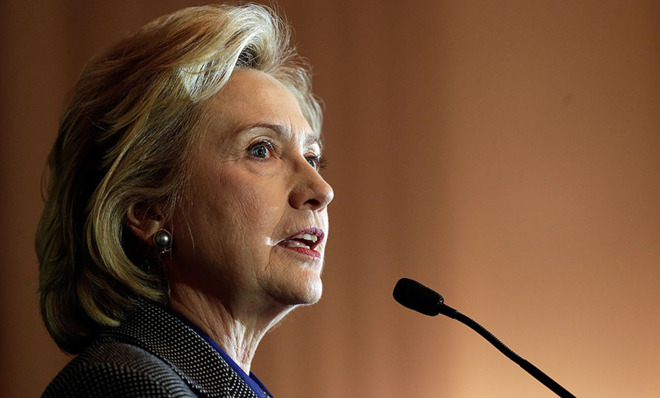Why do conservatives think The New York Times is covering for Hillary Clinton?
A massive investigative report supporting the Obama administration's narrative of the 2012 Benghazi attack has come under fire


A free daily email with the biggest news stories of the day – and the best features from TheWeek.com
You are now subscribed
Your newsletter sign-up was successful
It's been well over a year since the attack on the U.S. consulate in Benghazi, Libya, which left four Americans dead. But the debate about exactly what happened — and the Obama administration's response to it — continues to rage on. In a massive Dec. 28 report by David D. Kirkpatrick, The New York Times attempted to settle the matter once and for all:
Months of investigation by The New York Times, centered on extensive interviews with Libyans in Benghazi who had direct knowledge of the attack there and its context, turned up no evidence that al Qaeda or other international terrorist groups had any role in the assault. The attack was led, instead, by fighters who had benefited directly from NATO’s extensive air power and logistics support during the uprising against Colonel Qaddafi. And contrary to claims by some members of Congress, it was fueled in large part by anger at an American-made video denigrating Islam. [New York Times]
In other words, what reportedly happened lines up rather nicely with the White House's initial narrative, a controversial affair centering around Susan Rice that led to accusations that Obama was trying to cover up an al Qaeda plot in the run-up to the 2012 election. As Blake Hounshell at Politico notes, "These are the kinds of authoritative statements you make when you’re pretty darn sure of your reporting."
Case closed, right?
The Week
Escape your echo chamber. Get the facts behind the news, plus analysis from multiple perspectives.

Sign up for The Week's Free Newsletters
From our morning news briefing to a weekly Good News Newsletter, get the best of The Week delivered directly to your inbox.
From our morning news briefing to a weekly Good News Newsletter, get the best of The Week delivered directly to your inbox.
Not exactly. The Times' sprawling Benghazi story didn't just re-ignite the familiar debate about the attack; it also opened a new argument about the Times' own motive for running a 7,000-word Benghazi report that supported the Obama administration's version of events. Over the past few days, numerous conservative politicians and commentators have attacked the paper for publishing a story that partially exonerates the Obama administration — and by extension, then-Secretary of State Hillary Clinton, who is widely presumed to be the Democratic presidential candidate in 2016.
"I find the timing odd," said Republican Rep. Mike Rogers of Michigan, though he refused to directly attack the Times' motives. But plenty of others took their criticism further. In a recent Fox News appearance, influential columnist Charles Krauthammer speculated that the Times "invested all the effort and time" in its Benghazi story "to protect the Democrats. To deflect the issue. To protect Hillary, who was exposed on this issue as almost no issue in her tenure in the administration. It is obviously a political move."
Rep. Trey Gowdy (R-S.C.) told former White House Press Secretary Dana Perino that "all you have to do is read [The New York Times], and you can tell who they've endorsed, and what political ideology they've endorsed."
In response to the criticism, the Times editorial page editor Andrew Rosenthal posted a blog attacking the conservative commentators who "ran screaming to television studios" to question the motives of the paper. "The Republicans hope to tarnish Democratic candidates by making it seem as though Mr. Obama doesn’t take al Qaeda seriously," wrote Rosenthal. "They also want to throw mud at former Secretary of State Hillary Clinton, who they fear will run for president in 2016."
A free daily email with the biggest news stories of the day – and the best features from TheWeek.com
"Since I will have more to say about which candidate we will endorse in 2016 than any other editor at the Times, let me be clear: We have not chosen Mrs. Clinton. We have not chosen anyone. I can also state definitively that there was no editorial/newsroom conspiracy of any kind, because I knew nothing about the Benghazi article until I read it in the paper on Sunday."
Will the debate surrounding Benghazi ever go away? Probably not, says Politico's Hounshell, noting that other reports have conflicted with the Times' version of events. There's also the conservative media's deep mistrust of the mainstream press, which only grows by the day. Furthermore, even key terms are in dispute; while the Times concluded that al Qaeda did not plan or carry out the attack, some conservatives argue that Ansar al Sharia — an extremist group that reportedly did play a role in the Benghazi attack — should be considered a part of al Qaeda proper.
As long as hyperpartisanship exists — and as long as Hillary Clinton looms over the 2016 presidential race — we can expect the Benghazi incident will remain a point of contention.
Scott Meslow is the entertainment editor for TheWeek.com. He has written about film and television at publications including The Atlantic, POLITICO Magazine, and Vulture.
